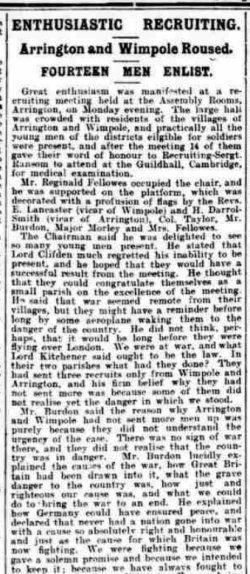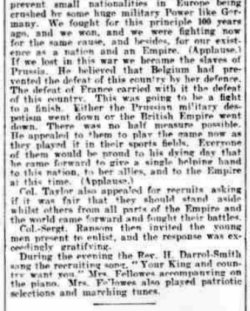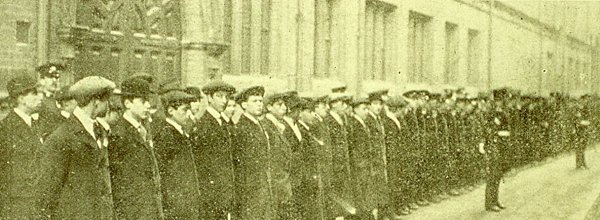 | A local history and genealogy site for Wimpole, a village and parish in South Cambridgeshire
Curated by Steve Odell
 |
WW1 Recruitment Drive - Wimpole and Arrington
Monday, 28 September 1914
at the Assembly Rooms, Arrington
|
A local history and genealogy page for the Parish of Wimpole.
|
|
| The following report was published in 'The Cambridge Independent Press' on Friday 2 October 1914, describing a Recruitment Meeting held in the Assembly Rooms, Arrington, on Monday 28 September. See also 'Ready for Rifles' (9 October 1914) below. |
|
 |

 |
| ENTHUSIASTIC RECRUITING. |
| Arrington and Wimpole Roused. |
| FOURTEEN MEN ENLIST. |
| "Great enthusiasm was manifested at a recruiting meeting held at the Assembly Rooms, Arrington, on Monday evening. The large hall was crowded with residents of the villages of Arrington and Wimpole, and practically all the young men of the districts eligible for soldiers were present, and after the meeting 14 [** see note below] of them gave their word of honour to Recruiting Sergeant. Ransom to attend at the Guildhall, Cambridge, for medical examination. |
"Mr. Reginald Fellowes [1] occupied the chair, and he was supported on the platform, which was decorated with a profusion of flags, by the Revs. E. Lancaster (vicar of Wimpole) [2] and H. Daroll Smith [3] (vicar of Arrington), Col. Taylor, Mr. Burdon, Major Morley and Mrs. Fellowes [4].
|
| "The Chairman said he was delighted to see so many young men present. He stated that Lord Clifden much regretted his inability to be present, and he hoped that they would have a successful result from the meeting. He thought that they could congratulate themselves as a small parish on the excellence of the meeting. He said that war seemed remote from their villages, but they might have a reminder before long by some aeroplane waking them to the danger of the country. He did not think, perhaps, that it would be long before they were flying over London. We were at war, and what Lord Kitchener said ought to the law. In their two parishes what had they done? They had sent three [** see note below] recruits only from Wimpole and Arrington, and his firm belief why they had not sent more was because some of them did lot realise yet the danger in which stood. |
| "Mr. Burden said the reason why Arrington and Wimpole had not sent more men up was purely because they did not understand the urgency of the case. There was no sign of war there, and they did not realise that the country was in danger. Mr. Burden lucidly explained the causes of the war, how Great Britain had been drawn into it, what the grave danger to the country was, how just and righteous our cause was, and what we could do to bring the war to an end. He explained how Germany could have ensured peace, and declared that never had a nation gone into war with a cause so absolutely right and honourable and just as the cause for which Britain was now fighting. We were fighting because we gave a solemn promise and because we intended keep it; because we have always fought to prevent small nationalities in Europe being crushed by some huge military Power like Germany. We fought for this principle 100 years ago, and we won, and we were fighting now for the same cause, and besides, for our existence as a nation and an Empire. (Applause) If we lost in this war we become the slaves of Prussia. He believed that Belgium had prevented the defeat of this country by her defence. The defeat of France carried with it the defeat of this country. This was going to a fight to a finish. Either the Prussian military despotism went down or the British Empire went down. There was no half measures possible. He appealed to them to play the game now as they played it in their sports fields. Every one of them would be proud to his dying day that he came forward to give a single helping hand to this nation, to her allies, and to the Empire this time. (Applause) |
| "Col. Taylor also appealed for recruits asking if it was fair that they should stand aside whilst others from all parts of the Empire and world came forward and fought their battles. |
"Colour-Sergeant Ransom then invited the young men present to enlist, and the response was exceedingly gratifying.
|
| "During the evening the Rev. H. Daroll Smith sang the recruiting song. “Your King and Country Want You” [5], Mrs Fellowes accompanying on the piano. Mrs Fellowes also played patriotic selections and marching tunes." |
|
[1] Reginald Octavius Fellowes, of Wimpole Lodge, estate agent to the Viscount Clifton.
[2] Reverend Edgar John Lancaster,
Wimpole Rectory, Rector at Wimpole 1914-1937.
[3] Reverend Henry Daroll Smith [correct spelling], the Vicarage, Arrington, Curate at Arrington and Wimpole.
[4]
Mrs Florence Fellowes, of Wimpole Lodge, wife to Reginald Fellowes.
[5]
Link to "Your King and Country Want You" [YouTube] as sung by Helen Clark in 1914. [Lyrics]
|
|
 |
| ** It is probable the 'three recruits' who had enlisted before the meeting were Harry Collin (Arrington) and two friends (and next-door neighbours) Frank Skinner (Wimpole) and William Waymen (Wimpole) who all enlisted in the 11th Battalion of the Suffolk Regiment during the second week of September 1914 at Cambridge. All three were killed during the war and are commemorated on the Wimpole and Arrington War Memorial. |
| Of the 'fourteen men' who pledged to enlist at the meeting, at least three lost their lives during the war and are commemorated on the War Memorial: David Matthews (Wimpole), Edward Charles Skinner (Wimpole) and Harry Wilkins (Wimpole). They are recorded as enlisting into the Suffolk Regiment at Cambridge within a week or so of the meeting. |
|
 |

 |
| "Ready for Rifles" |
| [Published in a Cambridge Newspaper 9 October 1914] |
| "The work of raising and training the new Cambridgeshire Battalions is proceeding very satisfactorily. Recruits are being treated well, comfortably housed, warmly clothed and well fed. Their physical improvement has been great and they have mastered the rudiments of drill and learned fixing and unfixing bayonets. When rifles arrive they will be well fitted to bear them. |
| "Troops are based at Melbourne Place School and the County Girls’ School where classrooms make admirable barrack rooms. The men sleep on the floor in straw palliasses – canvas bags filled with straw – and a blanket apiece. The kitchens are well equipped and the catering in the hands of Mr G.P. Hawkins of the Dorothy Café. |
| "At Melbourne Place school canteens have been installed adjoining the dining hall. Mr Dodds of the Abbey Stores, Abbey Road has one counter where soldiers can obtain all kinds of groceries, sardines, apples and walnuts together with writing materials, boot polish, braces and bachelors’ buttons. Everything is sold at moderate prices. A penny will purchase almost anything in stock. At the wet canteens men can obtain beer or minerals and hot coffee is supplied night and morning. |
| "At Melbourne Place School ‘reveille’ is sounded at 6 a.m. and, after coffee, men have a spell of Swedish exercises before breakfast. Then there are lectures on musketry or guard-mounting by NCOs, all old soldiers, followed by drill. After dinner there is a short period for a smoke or a look at the papers. Afternoon parade and drill follows, then a lecture before the men go for a short route march during which they are allowed to smoke and exercise their vocal abilities in ‘Tipperary’. After tea they are free until 9 pm |
| "Uniform and boots for the soldiers based at Melbourne Place School are expected to arrive shortly. Meanwhile they are wearing their civilian attire but have been issued with shirts and socks. The men seem happy and well-pleased with their lot. One farm labourer from Wood Ditton says “I’m better off now than I ever was. My guvnor’s paying me seven shillings a week and I’m getting seven bob here and board and lodgings and clothes”. He was contemplating marriage before the call to arms came but he and his sweetheart have patriotically agreed to wait until the war is over. Let us hope their happiness may not long be deferred." |
| [Courtesy Mike Petty's 'Cambridgeshire Scrapbook 1897-1990'] |
|
 |
The servicemen and women are listed under the Parishes of Arrington or Wimpole
as shown on the Cambridgeshire County War Memorial in Ely Cathedral. |
War Memorial research by Steve Odell.
|
The War Memorial Project would welcome any additional information, research,
photographs or memories of those named on the Wimpole and Arrington War Memorial. |
| Please contact the website. |
|
This page was last updated on: 09 October 2020.
|

